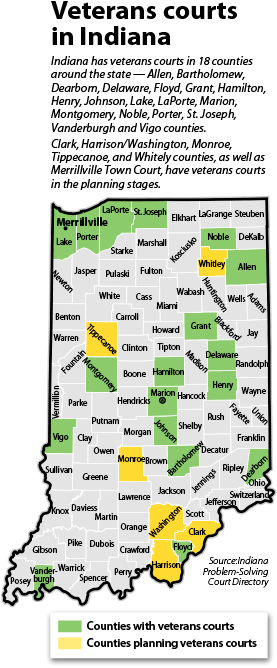Subscriber Benefit
As a subscriber you can listen to articles at work, in the car, or while you work out. Subscribe NowJohn Lamphier spent his first six months in the St. Joseph County Veterans Treatment Court continuing to abuse drugs and drink alcohol.
A veteran of the U.S. Marine Corps, Lamphier had tricked the system for years but he soon learned the problem-solving court was not so gullible. He got sent to jail for two days, then seven days, and for a time he had to come to court every day to see other people getting sentenced.
Eventually he realized, he either had to change or he would go prison for a long time.
“Veterans court really helped me get honest and get my life back,” he said.
Lamphier and five other former military members graduated from the veterans court during a special ceremony Nov. 21 at the courthouse in South Bend. Judges, attorneys, relatives and other veterans crowded into the second-floor courtroom to watch as the group of men received certificates for completing the program and congratulatory handshakes from veterans court Judge Steven Hostetler.
The hourlong ceremony opened with the color guard presenting the colors. Then retired St. Joseph Superior Judge and retired U.S. Naval Reserve officer Robert Miller Sr., dressed in his uniform, stepped to the podium and led the Pledge of Allegiance.
 Speaking from the bench, Hostetler told the audience, “Today we gather to reflect and reaffirm our continued and permanent commitment to care for those who have needs born from battle.”
Speaking from the bench, Hostetler told the audience, “Today we gather to reflect and reaffirm our continued and permanent commitment to care for those who have needs born from battle.”
The St. Joseph County Veterans Treatment Court was started in 2013 by St. Joseph Superior Judge Jane Woodward Miller. Currently the program has 18 participants and now has 12 graduates.
During her remarks, Woodward Miller spoke directly to the graduates, calling each by name and assuring them she cared very much for all of them. She explained the graduates had landed in the veterans court because their lives had become unmanageable and they were facing criminal charges. The problem-solving court was a way to provide them with the individualized, community-based, treatment-oriented approach they needed.
However, she noted, “Veterans court is not a magic bullet. In the end, restoring one’s life is an inside job.”
Daniel Newman, who graduated from veterans court in April 2016, knows well the hard work required to get back on track. After his discharge from the U.S. Air Force, he engaged in criminal behavior to support his substance abuse habit and was facing a six-year prison term when he entered the problem-solving court.
“There’s only one thing you have to change and that’s everything,” he said, explaining his success.
Attired in his uniform, beret and white gloves, Newman said his problems began before the military. He grew up in a dysfunctional family and never thought too much of himself. He tried to do the right things but always seemed to get into trouble.
Veterans court, he said, helped him realize he needed to walk away from everyone he had known. As he began rebuilding his life and trying to figure out whom he could rely on, the court staff was there to support him and offer reminders when he reverted to his old ways.
Newman still has struggles but noted, “Things do just keep getting a little better day by day.”
At the graduation ceremony, Marine veteran Arvil Howe talked of returning home from Vietnam in 1971 and being spat upon at the airport in San Francisco. He went on to become an attorney but a pair of drunken-driving incidents got his license suspended and led him to the veterans court. His status in the Indiana bar since has been restored to active in good standing.
He acknowledged he was reluctant to participate and first denied he had problems. Now he is thankful for all those who worked to create the veterans court.
“We appreciate the fact that there’s somebody willing to do something to help us,” Howe said.
Elkhart Superior Judge Evan S. Roberts, a lieutenant colonel in the U.S. Marine Corps Reserve, attended the ceremony and congratulated the veterans afterward. He struggled to explain why some former military personnel have such difficulty in civilian life but noted veterans courts work because the participants share the common bond of training, beliefs and willingness to support their country.
Lamphier had arrived at the courthouse nearly an hour before the ceremony was set to begin. He spent part of his wait time listing some of the items he has been able to purchase since his money no longer goes to buying drugs and liquor. But sitting beside him was what he most treasured — his father. The two re-established their relationship when the elder gave his son a second chance.
Being able to graduate from veterans court meant a lot to the former Marine.
“It means showing you can really change things in your life,” he said. “You just have to apply yourself, don’t give up on yourself or sell yourself short.”•
Please enable JavaScript to view this content.

